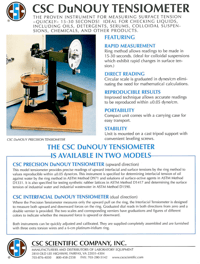Surface Tension and Interfacial Tension
We offer a selection of tensiometers that we think will fit your needs. Our tensiometers perform surface tension and interfacial tension tests that meet the popular ASTM methods including:
- ASTM D971: Interfacial Tension of Oil Against Water
- ASTM D1331: Solutions of Surface Acting Agents
- ASTM D1417: Synthetic Rubber Lattices
- ASTM D1590: Surface tension of industrial water and Industrial waste water
Manual Tensiometers we offer
- Manual operation
- Only DuNouy ring method
- Measurement range: 0-90 dynes/cm
- Accuracy: +/- 0.5 dynes/cm
- Measurement: apparent surface tension
(Note, this demonstration video is conducted using the 70545 Interfacial Tensiometer. We use this video also to show how the 70535 Precision Tensiometer works. They essentially work the same.)
How to Operate a Model 70545 Tensiometer (Interfacial)

- Manual operation
- Only DuNouy ring method
- Measurement range: 0-90 dynes/cm
- Accuracy: +/- 0.1 dynes/cm
- Measurement: apparent surface tension and interfacial tension
(Note, this demonstration video is conducted using the 70545 Interfacial Tensiometer. We use this video also to show how the 70535 Precision Tensiometer works. They essentially work the same.)
How to Operate a Model 70545 Tensiometer (Interfacial)

Automatic and Digital Tensiometers we offer
- Manual operation
- Both DuNouy ring and Wilhelmy plate method
- Measurement range: 0-500 dynes/cm
- Accuracy: 1.0 dynes/cm
- Maximum capacity: 210g
- Friendly key function and digital LCD display
- Automatic operation
- Both DuNouy ring and Wilhelmy plate method
- Measurement range: 0-1,000 dynes/cm
- Maximum capacity: 250g
- Accuracy: 0.1 dynes/cm
- Friendly key function and digital LCD display

 |
DST-60 BrochureClick here for brochure https://hubs.ly/Q02QN9Jh0 |
- Advanced automatic operation
- Both DuNouy ring and Wilhelmy plate method
- Accuracy: 0.01 dynes/cm
- Automatically records the Lamella length (DuNouy ring)
- Auto close outer wall, ergonomic, user-friendly design
- Able to measure density data of liquids by underwater displacement
- Fully automatic measuring process (software control)
- Basic supporting functions
- 1) Zisman plots 2) Surface energy calc. 3) Surface tension (DuNouy Ring & Wilhelmy method) 4) Dynamic contact angle
- Results data, able to export to excel
- Built-in water circulator connection ports (works with any commercial water baths)
- Built-in internal water circulation chamber (for use with water bath)
- Displays entire measuring process in real-time
- Built-in calibration functionality
- Expandability: easy to add measurement options including absorption, powder wettability, CMC, and more
 |
DCA-200 BrochureClick here for brochure https://hubs.ly/Q02QN9SF0 |
If you're uncertain about the model you require, kindly click on the link below to access our Surface Tension Questionnaire. This questionnaire is tailored to gather all the necessary information upfront, streamlining the process and enabling us to offer the most suitable solution for your needs.




